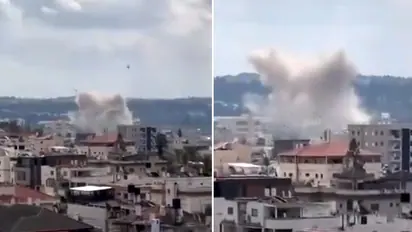Hezbollah launches rockets from Lebanon into central Israel hours after IDF's 'limited' ground raids (WATCH)

Synopsis
Hours after Israel launched 'targeted ground raids' in Lebanon, Hezbollah on Tuesday fired multiple rockets into central Israel, with one missile landing in Kfar Qassem, an Arab village located in the heart of the country.
Hours after Israel launched 'targeted ground raids' in Lebanon, Hezbollah on Tuesday fired multiple rockets into central Israel, with one missile landing in Kfar Qassem, an Arab village located in the heart of the country. The incident, confirmed by the Israel Defense Forces (IDF) in a post on X (formerly Twitter), highlights the ongoing threat posed by the Iran-backed militant group as air raid sirens blared across major urban centers, including Tel Aviv.
"A missile fired by Hezbollah at Israel fell directly in Kfar Qassem, an Arab village in central Israel, after Hezbollah once again fired projectiles at central Israel. Hezbollah doesn’t care who, or how. They only care about harming Israelis," wrote IDF in a post on X along with a video.
Israeli media is reporting that one person has been “moderately wounded” after a rocket barrage fired from inside Lebanon aimed at locations in central Israel.
In response to the barrage, alert sirens sounded in numerous towns and cities across central Israel and the Sharon area, including Kfar Saba and Ra’anana. Residents reported hearing loud booms as the situation escalated.
Earlier today, IDF spokesperson Daniel Hagari addressed the media, warning that Hezbollah had been planning to use homes in southern Lebanon as "staging grounds for an October 7-style invasion." He emphasized that Hezbollah's operations were not just limited to military actions but included plans to attack Israeli communities and inflict significant casualties among civilians. This warning comes almost a year after a major incursion by Hamas, which resulted in widespread fatalities and the abduction of numerous hostages.
"We will not let the 7th of October happen again on any one of our borders," Hagari asserted, referring to the deadly events that triggered the ongoing conflict in Gaza.
Hagari further criticized the violation of UN Resolution 1701, which prohibits Hezbollah from maintaining a military presence south of the Litani River, approximately 30 kilometers from Israel's border. "Eighteen years after 1701, Hezbollah is the world’s largest non-state army, and southern Lebanon is swarming with Hezbollah terrorists and weapons," he stated.
In response to the escalating violence, Lebanese Prime Minister Najib Mikati has expressed Beirut's readiness to fully implement Resolution 1701 and deploy the Lebanese army south of the Litani River. This statement comes amid increasing pressure on the Lebanese government to address Hezbollah's military presence and activities along the border with Israel.
The situation remains tense as the IDF prepares for possible further escalations, emphasizing that its operations are aimed at neutralizing the threat posed by Hezbollah while minimizing harm to Lebanese civilians. The ongoing conflict highlights the fragile security landscape in the region and the complexities involved in addressing the threats posed by non-state actors like Hezbollah.
As both sides brace for potential further confrontations, the international community watches closely, concerned about the implications of this escalation for regional stability.
Check the Breaking News Today and Latest News from across India and around the world. Stay updated with the latest World News and global developments from politics to economy and current affairs. Get in-depth coverage of China News, Europe News, Pakistan News, and South Asia News, along with top headlines from the UK and US. Follow expert analysis, international trends, and breaking updates from around the globe. Download the Asianet News Official App from the Android Play Store and iPhone App Store for accurate and timely news updates anytime, anywhere.